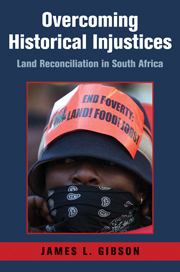Book contents
- Frontmatter
- Contents
- List of Figures
- List of Tables
- Preface and Acknowledgments
- 1 Land Reconciliation and Theories of Justice, Past and Present
- 2 Naming, Blaming, and Claiming on Historical Land Injustices: The Views of the South African People
- 3 Group Identities and Land Policy Preferences
- 4 Applied Justice Judgments: The Problem of Squatting
- 5 Judging the Past: Historical versus Contemporary Claims to Land
- 6 Land Reconciliation and Theories of Justice
- Appendix A A Note on Race in South Africa
- Appendix B The Survey Methodology
- Appendix C The Questionnaire
- References
- Index
- CAMBRIDGE STUDIES IN PUBLIC OPINION AND POLITICAL PSYCHOLOGY
4 - Applied Justice Judgments: The Problem of Squatting
Published online by Cambridge University Press: 27 July 2009
- Frontmatter
- Contents
- List of Figures
- List of Tables
- Preface and Acknowledgments
- 1 Land Reconciliation and Theories of Justice, Past and Present
- 2 Naming, Blaming, and Claiming on Historical Land Injustices: The Views of the South African People
- 3 Group Identities and Land Policy Preferences
- 4 Applied Justice Judgments: The Problem of Squatting
- 5 Judging the Past: Historical versus Contemporary Claims to Land
- 6 Land Reconciliation and Theories of Justice
- Appendix A A Note on Race in South Africa
- Appendix B The Survey Methodology
- Appendix C The Questionnaire
- References
- Index
- CAMBRIDGE STUDIES IN PUBLIC OPINION AND POLITICAL PSYCHOLOGY
Summary
In many cities throughout the world, governments are confronted with serious problems of “land grabbing” by poor people. As the landless poor flock to the urban areas, they often find that the only housing option available is to “squat”: to occupy and live on a piece of vacant land. The slums of most cities in the world, and nearly all cities in the Third World, are brimming with squatters (see Neuwirth 2005, who estimates that there are more than one billion squatters in the world today).
Nowhere is this problem more acute than in South Africa. With the crumbling of apartheid came the end of the much hated race-based restrictions on individual mobility. Consequently, the countryside has emptied as citizens have made their way to the cities in hopes of a better life. The first step toward this better life, however, is finding a place to live. For many, squatting is the only possibility. Squatting is not new to South Africa (e.g., Murray and O'Regan 1990; Field 2001), but the magnitude of the problem of urban land grabs is enormous, unprecedented, and growing. Virtually every piece of vacant land in South Africa's cities is at risk.
Land grabbing is an extremely important problem for the homeless, for landowners, and for governments. But land grabbing also presents intriguing theoretical issues because it so clearly pits alternative conceptions of justice against each other. On the one hand, the sanctity of private (or state-owned) property may justify removing the squatters from their perches.
- Type
- Chapter
- Information
- Overcoming Historical InjusticesLand Reconciliation in South Africa, pp. 132 - 168Publisher: Cambridge University PressPrint publication year: 2009



